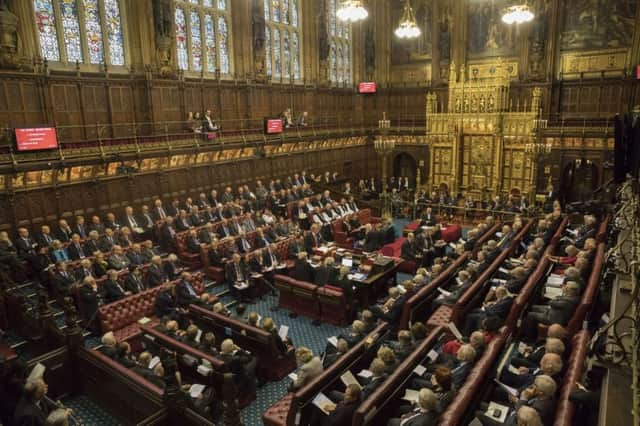Will crisis over Brexit spark House of Lords reform?


Despite promises to the contrary, the ‘Clause 11’ sections of the bill relating to Scotland will now be amended in the House of Lords, not the House of Commons.
As SNP MP Stewart McDonald said: “So (controversial Baroness) Michelle Mone has more of a say on this bill than elected MPs.”
Advertisement
Hide AdAdvertisement
Hide AdWhile the SNP have maintained a long-standing opposition to the House of Lords, it has been brought into sharp relief by the current row, which could be the forerunner to a full-blown constitutional crisis if Holyrood votes against giving ‘legislative consent’ to the bill.
It might not be their campaigning priority for the party to get rid of the House of Lords, but with the upper chamber not lacking problems, they could have some unlikely bedfellows.
We look at how Brexit could spark more life into an age-old debate on the future of one of the world’s oldest legislative bodies.
Mone-gate
The SNP have, even before the news about Clause 11 amendments broke, stepped up their criticism of the upper chamber over the festive period.
Having previously described the institution as a ‘national embarrassment’, the party produced research in December highlighting the spending by peers on subsidised alcohol.
Nicola Sturgeon and her colleagues will feel emboldened to continue that criticism as they highlight what they see as a democratic deficit in the crucial elements of the Brexit bill being handled by unelected peers (though it is unlikely Michelle Mone will table any amendments).
While the Lords’ amendments will eventually be pored over by MPs, it is still a source of embarrassment for the Scottish Conservatives that they were unable to hold David Mundell to his promise to meet a deadline for amending the bill in the Commons.
Any embarrassment for the Tories is good news for the SNP, and they will continue to use this standoff over Brexit to highlight their anger over the House of Lords.
Advertisement
Hide AdAdvertisement
Hide AdAs MSP Claire Haughey said last month: “This continued drain on the public purse underlines the case for Scotland to govern itself.”
Unlikely bedfellows
With some notable exceptions, the Conservatives have always been the party to resist sweeping House of Lords reform.
The party has in the past taken issue with what they perceive as an imbalance in its makeup, but outright calls for abolition from Tory politicians are few and far between.
That could change, as the upper house continues to frustrate some of the Government’s plans over Brexit.
Less than a year since the election, Theresa May’s Government has been defeated several times in the Lords, most recently last night on a new stage of the Leveson Inquiry.
The upper house has previously backed a ‘meaningful’ parliamentary vote on the final terms of any Brexit deal.
The Conservatives, like in the House of Commons, lack an overall majority in the Lords, and are outnumbered by crossbench, Labour and Lib Dem peers.
The previous solution to such an imbalance would be to create a raft of new peers, but with nearly 800 members already, that is not a viable option, and the cost would be hard to justify amid continued austerity.
Advertisement
Hide AdAdvertisement
Hide AdIt is unlikely that a groundswell of Conservative opinion to abolish the House of Lords will emerge, but as frustrations among Brexiteers grow, reform of a notoriously reform-resistant institution could become a reality as Britain leaves the EU.
Current status
Jeremy Corbyn, in travelling from outsider to realistic candidate for Prime Minister, has had to make some compromises on his beliefs, and the quiet announcement that Labour had contributed to the New Years’ Honours list was proof of that.
Labour’s manifesto stopped short of calling for outright abolition at the 2017 General Election, but the party has previously said that no more new appointments should be made.
The Liberal Democrats are opposed to the Lords in principle, but with 100 peers compared to just 10 MPs, the party hasn’t been shy about adding to the numbers in the upper house.
With their influence in the Lords far outstripping their current political fortunes, it is unlikely they will spearhead any move to abolish the institution.
If Theresa May continues to be frustrated by peers, however, and the SNP puts opposition to the Lords a key tenet of their argument over the Brexit Withdrawal Bill, changes to how Britain is governed might be closer than we think.
